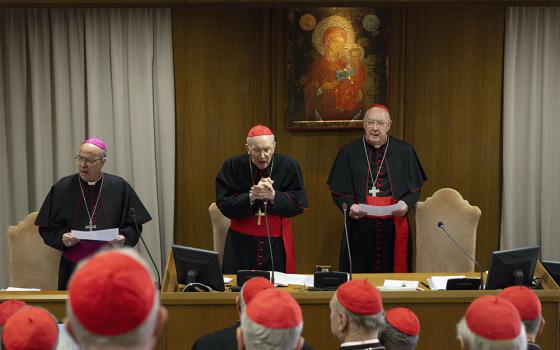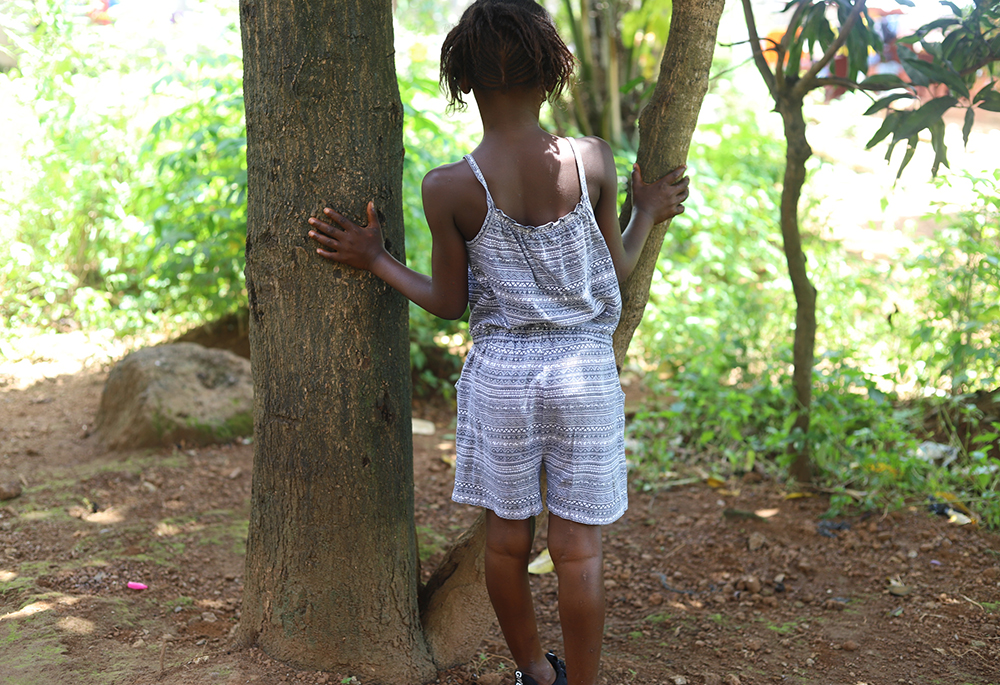
Mary Aminata (whose name has been changed) explains how her grandfather raped her for years before Catholic leaders rescued her. She is among hundreds of young girls receiving care at Don Bosco Fambul in Waterloo, a southern town of Sierra Leone. (GSR photo/Doreen Ajiambo)
Eight-year-old Mary Aminata sat on a plastic chair in the shade of a tree outside her parent's house in this southern town of Sierra Leone. She tearfully narrated her harrowing ordeal at the hand of her paternal grandfather, who subjected her to years of sexual abuse until Catholic leaders rescued her.
"My grandfather used to rape me every night whenever my grandmother was either away or asleep," she lamented, tears streaming down her cheeks as she tugged nervously at her dress.
Requesting anonymity, Aminata (whose name has been changed) said the pain was unbearable. "One day, I told my grandmother about the rape, and she warned me against telling anyone because it would shame the family."
A second grader at P.A.W. Primary School, Aminata revealed that her mother abandoned her at her grandparent's home when she was 4 to go and look for a job in Freetown, the country's capital. At the time, she said, her parents had divorced.
Aminata told Global Sisters Report that she was rescued last year by one of the catechists when she shared her ordeal during one of her catechism classes. After the catechists listened to her, she said, they took her to Don Bosco Fambul, a child welfare organization in Freetown, run by the Salesians of Don Bosco, which operates a shelter for minors who have experienced sexual abuse and human trafficking.
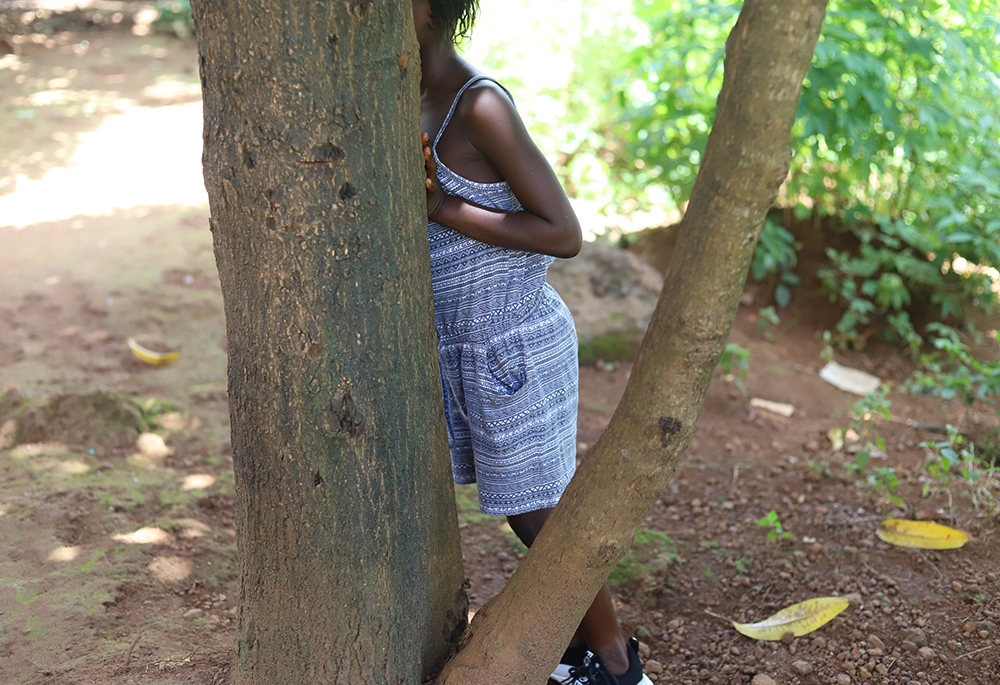
Mary Aminata (name changed), a rape survivor, hides behind a tree at her home on Sept. 17, 2023, in Waterloo, a southern town of Sierra Leone. (GSR photo/Doreen Ajiambo)
"It pains me a lot, and I even find it difficult to sleep because of the nightmares due to what happened to me," she said, noting that her grandfather was later arrested by police after Catholic leaders at Don Bosco Fambul reported the matter to authorities. "I am always scared of boys or any man around me, including my father."
Aminata is among thousands of children and young girls in Waterloo and other parts of Sierra Leone whom Catholic leaders have rescued from sexual abuse and given guidance and counseling, and later helped to get justice and further their education.
Catholic charitable organizations and religious congregations of women and men in the Catholic Church work together with the government and other stakeholders in rescuing these underage girls and boys. They are then sheltered at Don Bosco Fambul, which was established in 1998 and currently houses more than 200 children.
Advertisement
The West African coastal nation of more than 8 million people has a high rate of gender-based violence, specifically physical and sexual violence, where an estimated 62% of women ages 15-49 are said to have experienced either physical or sexual violence, according the Sierra Leone Demographic and Health Survey.
In 2020, for example, the Sierra Leone police's annual crime statistics report recorded 12,830 cases of gender-based violence: 9,600 domestic violence cases, 3,091 cases of sexual penetration of a child, and 139 rape cases. However, activists have said that the number of cases is likely higher, as many cases are never reported out of shame and fear.
In February 2019, President Julius Maada Bio declared a state of emergency on rape and sexual violence and later amended the country's sexual offense laws, including introducing life imprisonment for those convicted of sexual offenses against minors.
Nevertheless, the Catholic leaders revealed that the violence continued to thrive years after the president declared a state of emergency over sexual and gender-based violence.
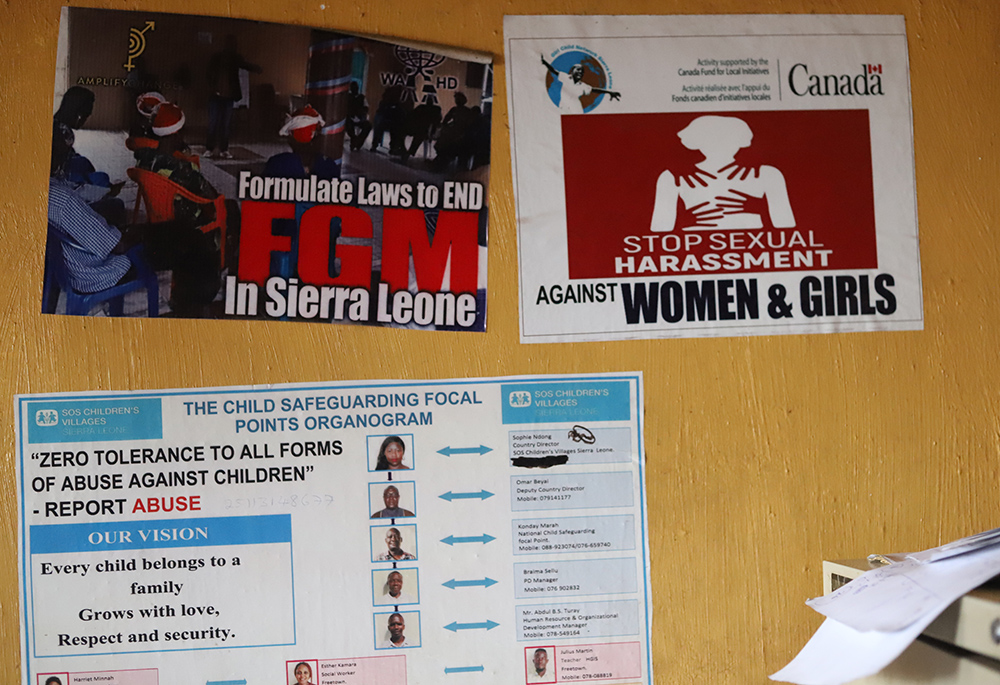
Posters calling for the end of violence and rape against women in Sierra Leone are displayed on the wall of the Caritas office in Waterloo, a southern town of Sierra Leone. The Catholic Church is partnering with other stakeholders to fight the rampant sexual abuse against girls and women. (GSR photo/Doreen Ajiambo)
A report by the United Nations indicates that the high number of sexual abuses in Sierra Leone is linked to gender inequality. In Sierra Leone, one of the poorest countries in the world, women are considered to be of lower status with limited rights in all spheres of life. The organization also notes that a lack of faith in the justice system and poverty contribute to sexual abuse. Additionally, violence continues to thrive because of fear of social taboos that are against speaking publicly about rape and other sexual violence.
Sr. Onyinyechukwu Ezejesi, a member of the Missionary Sisters of the Holy Rosary, said her congregation was touring villages, schools, marketplaces, and other public gatherings every week to raise awareness and emphasize that sexual and gender-based violence had no place in society. The nun revealed that their campaign was making a significant impact as most residents are now able to understand the existing laws on sexual violence and who they can turn to when seeking help.
"To fight sexual abuse, all hands must be on deck in creating awareness and sensitization to all and sundry, all allies working together from the grassroots to the top in bringing systemic change holistically," she said. "Our congregation partners with Don Bosco Fambul, which allows us to keep those rescued in their shelter for two weeks. The girls are later enrolled in other institutions to get training on hands-on skills like cooking and tailoring, among others, to help them care for themselves."
The Catholic leaders have also speculated that sexual and gender-based violence is mainly attributed to the country's bloody 1991-2002 civil war that killed an estimated 70,000 people and displaced roughly 2.6 million people — more than half the population at the time. A 2002 report, produced with assistance from the United Nations, estimated that, at the time, more than 200,000 girls and women in Sierra Leone might have been affected by sexual violence.
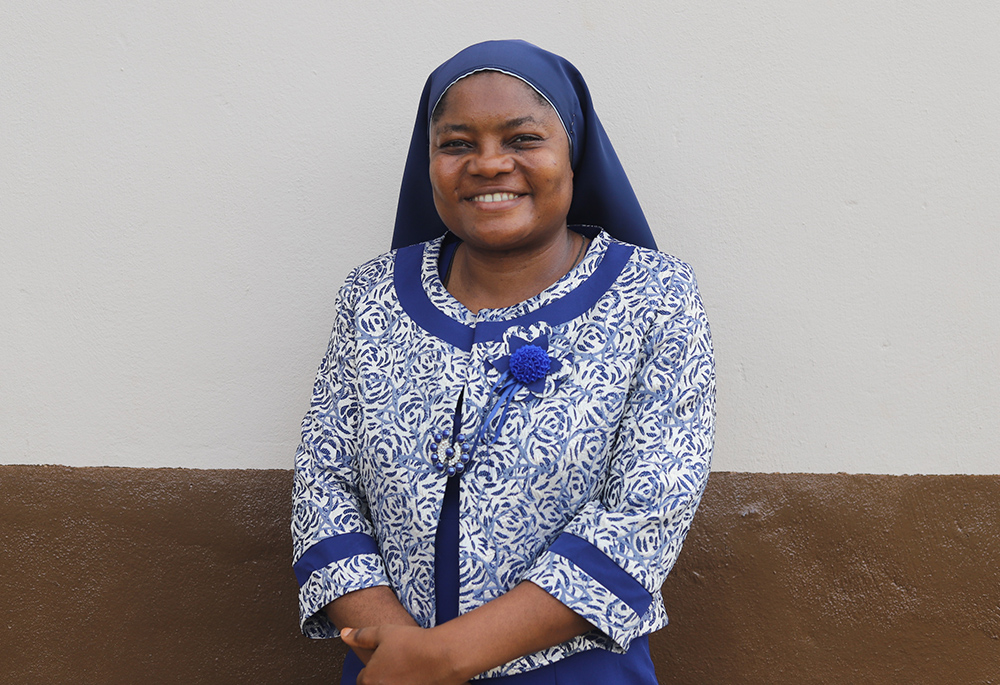
Sr. Onyinyechukwu Ezejesi, a member of the Missionary Sisters of the Holy Rosary, works with other stakeholders to fight sexual abuse against women and girls in Sierra Leone. (GSR photo/Doreen Ajiambo)
"They were not punished for their actions afterward," explained Ezejesi of the perpetrators, adding that the trend continues because the majority of men still think that it's normal to rape women and girls.
"The way men used to see women during the civil war as people — of low class and with no rights — is still being seen," she said. "Sierra Leone is more of a patriarchal society."
Fr. Sergej Goman, the director of Don Bosco Fambul, said his organization had invested in prevention education services in schools, families, churches and other public gatherings to educate women and girls on how to detect potential rapists, where to report cases of sexual violence and where to find shelter.
"As a church, we have taken it upon ourselves to ensure women and girls are protected from rape, sexual violence or any form of abuse," said Goman, a member of the Salesians of Don Bosco in Sierra Leone.
Kumba Emmanuella Gando, a social counselor at Caritas Sierra Leone, said that sexual and gender-based violence often leaves girls and women with life-long emotional distress — including nightmares and flashbacks — as well as mental health problems and poor reproductive health. She said many women and girls are also at a high risk of acquiring HIV. Some get pregnant, their dream of an education feels shattered, and, in the worst case, they could commit suicide, she said.
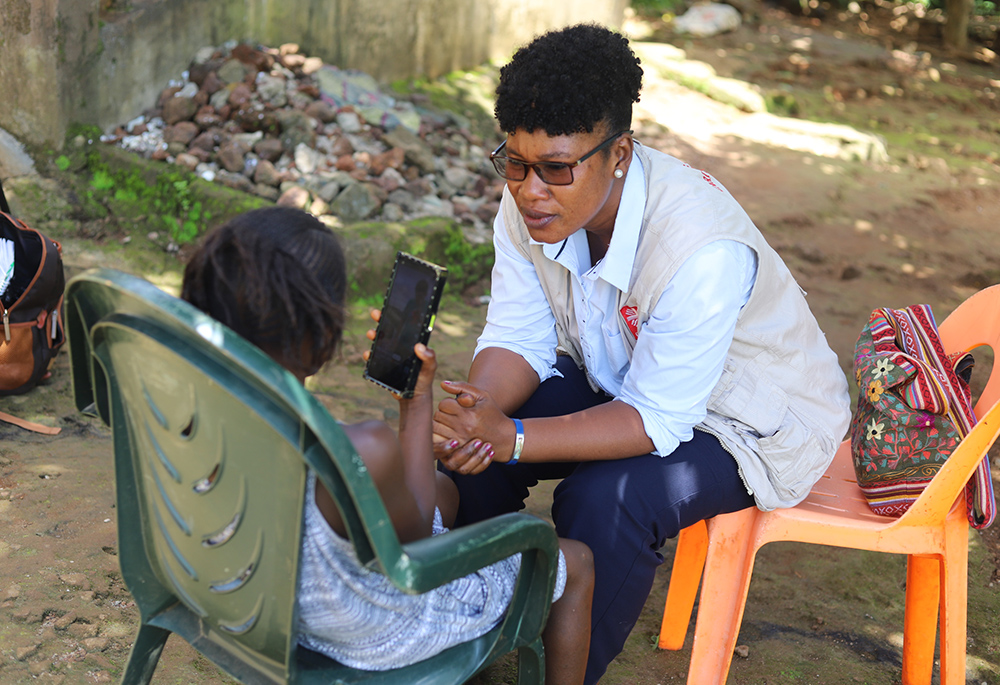
Kumba Emmanuella Gando, a social counselor who works with Caritas Sierra Leone, speaks to a rape survivor on September 17, 2023, in Waterloo, a southern town of Sierra Leone. (GSR photo/Doreen Ajiambo)
Gando noted that survivors of rape and sexual violence in Sierra Leone also face numerous challenges in accessing justice, including community and family pressure to drop their case, the unwillingness of police and judicial officers to help, insufficient legal aid, and threats from perpetrators.
She said that, together with other counselors, they visit Don Bosco Fambul thrice a month to do free counseling services for abused children and their families. With the help of police, Gando said they go to the homes and villages or streets of those who are facing sexual violence and rescue them by taking them to shelter at Don Bosco Fambul; they also get calls from people who report cases of sexual abuse, and they are able to follow up and rescue the victims, offering them access to free medical treatment.
"Counseling is a process," Gando said. "You must be patient to listen to survivors and understand the trauma they have gone through before you start counseling and making them accept their situation.
"Healing from trauma depends on each individual," Gando continued. "You cannot gauge and say 'I will do this for two or three months.' Some heal faster, others take time, so you must assess each victim individually."
One of the survivors, age 21, who is sheltering at Don Bosco Fambul, is one of the beneficiaries of Gando's counseling services. She said her uncle started raping her at the age of 16, and she had to run away from her uncle's home after two years of molestation.

A survivor is pictured receiving training on how to sew at a Don Bosco Fambul center on September 17, 2023, in Waterloo, a southern town of Sierra Leone. The church leaders support sexual abuse survivors by offering them shelter, medical assistance, guidance, and counseling. They also provide them with sewing, catering and hairdressing skills. (GSR photo/Doreen Ajiambo)
"While in the streets, I tried taking away my life thrice due to stress and frustration," she said, revealing that she had to live in the streets for nearly two years before she was rescued in 2022 by Catholic leaders and taken to Don Bosco Fambul.
The survivor said the guidance and counseling she has received from Gando and other counselors at the center has helped her to accept her situation, forgive her tormentor and heal from trauma. She said the Catholic leaders have helped her to enroll in catering classes, which will change her life and prospects for the better.
"I thought my life had come to an end when I was raped and later lived on the streets," she said. "But I am glad I was rescued, and now I am rebuilding my life."
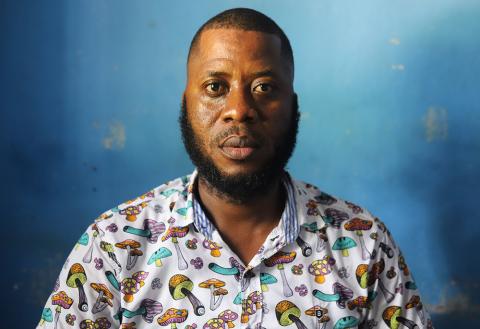
Alieu Jalloh, Waterloo Police spokesperson, works with the church and other stakeholders to fight against sexual violence in Sierra Leone. (GSR photo/Doreen Ajiambo)
Police lauded the Catholic leaders for protecting, rescuing and helping survivors of sexual and gender-based violence. "Since we started working with the church, things have improved. We have been able to arrest and charge perpetrators, and cases of sexual abuse have been reduced," said Alieu Jalloh, Waterloo's police spokesperson.
Meanwhile, Aminata believes that the only way to end sexual and gender-based violence is for the government to arrest all perpetrators.
"All rapists need to be in jail so that they don't continue to hurt others like they did to me."




